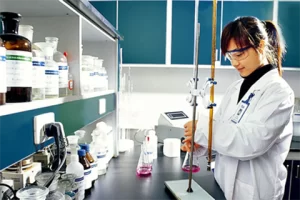Where they work
Quality management Department
The activities
- Laboratory staff work in company laboratories to perform activities such as collecting samples, conducting experiments, manipulating machines, analyzing and researching. Laboratory staff all work with laboratory equipment to analyze samples or substances, test and report findings and changes.
- In most small companies, lab staff can act as QC or QA staff. Laboratory staff performs the following duties:
- Collecting, receiving, labeling, and/or analyzing samples and compounds using the correct laboratory equipment.
- Designing and performing experiments, and laboratory tests in accordance with standard procedures, recording observations, and interpreting findings.
- Storing all test data and test results accurately, in the specified format (written and on a computer system).
- Organizing and storing all chemicals, liquids, and compressed gases according to safety guidelines.
- Ensuring that safety instructions are followed at all times in the laboratory.
- Maintaining daily logs and equipment notebooks.
- Cleaning, disinfecting, maintaining, and calibrating laboratory instruments.
- Order laboratory supplies when required.
- Technical support when needed.
- Staying up to date with relevant scientific and technical developments.
Qualifications
Bachelor’s Degree in Food Technology or Postharvest technology
Technical skills
- Specialized knowledge
- Staff must have in-depth knowledge in the field of agri-food and food analysis (food chemistry and food microbiology). In addition, staff need to understand the operating principles of the equipment systems used in the analysis.
- Specialized skills
- Staff must operate and perform food analysis equipment and instruments competently. Laboratory staff need to be able to detect problems and have a solid grasp of sampling procedures and methods. In addition, staff should have in-depth knowledge of laboratory safety management systems, laboratory precautions and best practices.
Computer and linguistic knowledge
- People working in this field require computer skills to analyze statistical data and good command of English to stay up to date with relevant scientific and technical developments in the world. They need to be proficient in using some statistical software in food analysis.
Personality and availability
- Soft skills
- Soft skills such as independent or teamwork, report writing, presentation, and analytical skills are essential for laboratory staff.
- Personal qualities and Availabilities for the activity
- Carefulness and honesty with analytical data to give reliable data play an important role in analyzing and dealing with risks occurring in food production. They must be available to work outside hours and on weekends or go on business.



